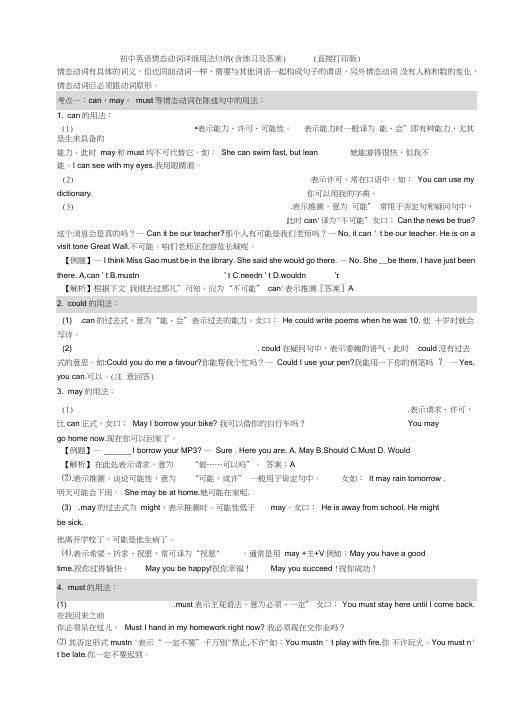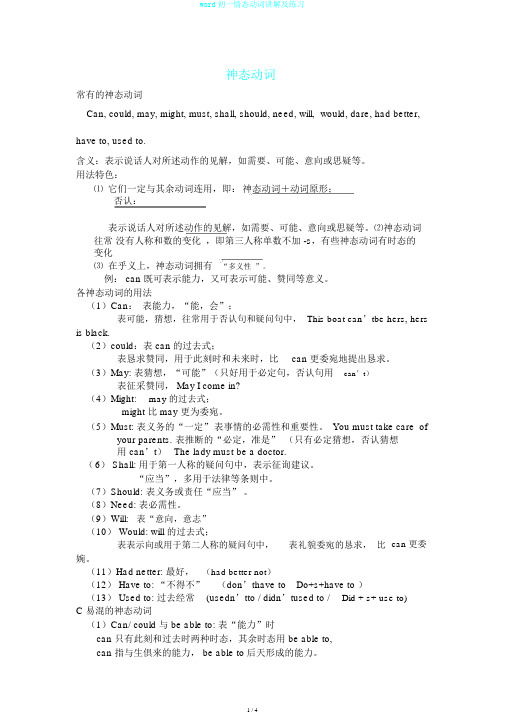(完整版)初一情态动词的讲解与练习(可编辑修改word版)
- 格式:docx
- 大小:13.65 KB
- 文档页数:6

(完整word版)初一情态动词用法讲解及练习册初一情态动词用法讲解及练册一、情态动词的概念情态动词是指用来表示说话人的情感、意愿、能力、估计或推测等语气或情态的动词。
在英语中,常用的情态动词有can、could、may、might、shall、should、will、would、must、need等。
二、情态动词的用法1. 表示能力与能力许可:can、could- can表示一般的能力,could表示过去的能力。
- 通常在肯定句中用can,否定句和疑问句中用can't或cannot。
- 用于邀请和请求时,一般只用can。
- could用于委婉表示请求、邀请、建议或询问时。
2. 表示推测或猜测:may、might- may和might都可以表示可能性。
- may常用于肯定句,might常用于疑问句或否定句。
3. 表示义务或必要性:must、have to、need to- must表示说话人的主观判断,have to表示客观上的必须。
- need to表示需要,用于肯定句。
4. 表示意愿、请求或建议:shall、should、will、would- shall用于疑问句中提出请求或建议。
- should用于陈述句中表示建议或意愿,也可以用于疑问句中。
- will表示意愿,would表示过去经常这样做或愿意做。
- would可以用于表示客气的请求。
三、情态动词的练请根据下列句子,根据语境填入适当的情态动词:1. Can you help me with this homework, please? I _________really appreciate it.3. The weather is getting warmer. It _________ rain later.4. I'm not sure if I _________ make it to the party. I might have other plans.5. _________ you like to have dinner with me tonight?6. You _________ go to bed early, or you'll be tired tomorrow.答案:1. would2. must3. may4. can5. Would6. should7. would以上是关于初一情态动词用法的讲解及练习册。

初中英语情态动词详细用法归纳(含练习及答案) (直接打印版)情态动词有具体的词义,但也同助动词一样,需要与其他词语一起构成句子的谓语,另外情态动词没有人称和数的变化,情态动词后必须跟动词原形。
1. can的用法:(1)•表示能力、许可、可能性。
表示能力时一般译为能、会”即有种能力,尤其是生来具备的能力,此时may和must均不可代替它。
如:She can swim fast, but lean 她能游得很快,但我不能。
I can see with my eyes.我用眼睛看。
(2)表示许可,常在口语中。
如:You can use my dictionary. 你可以用我的字典。
(3).表示推测,意为可能” 常用于否定句和疑问句中,此时can'译为"不可能”女口:Can the news be true?这个消息会是真的吗?一Can it be our teacher?那个人有可能是我们老师吗?一No, it can ' t be our teacher. He is on a visit tone Great Wall.不可能。
咱们老师正在游览长城呢。
【例题】一I think Miss Gao must be in the library. She said she would go there. —No. She __be there, I have just beenthere. A.can ' t B.mustn ' t C.needn ' t D.wouldn 't【解析】根据下文我刚去过那儿”可知,应为“不可能” can'表示推测[答案]A(1) .can的过去式,意为“能、会”表示过去的能力。
女口:He could write poems when he was 10. 他十岁时就会写诗。
(2) . could在疑问句中,表示委婉的语气,此时could没有过去式的意思。

修改名词:初一情态动词的详细解释及练习附答案什么是情态动词?情态动词是一类用来表示说话人的意愿、能力、推测、允许、建议等含义的动词。
在英语语法中,情态动词有一些独特的特点。
在初一阶段研究英语时,我们常常会遇到一些常见的情态动词,比如can、could、may、might、must、shall、should、will、would等。
初一情态动词的详细解释以下是初一阶段常见的情态动词及其用法的详细解释:- can/could:can/could:- 表示能力、会做某事,也可以用于征求许可或请求。
- 例如:- Can you swim?(你会游泳吗?)- Could I use your pen?(我可以用你的笔吗?)- may/might:may/might:- 表示允许、许可,也可以用于推测或提出建议。
- 例如:- May I go to the restroom?(我可以去洗手间吗?)- He might be late for the meeting.(他可能会迟到会议。
)- must:must:- 表示必须、肯定,常用于表达强烈的推断、假设或建议。
- 例如:- You must finish your homework before playing.(玩之前你必须完成作业。
)- It must be cold outside.(外面肯定很冷。
)- shall/should:shall/should:- 表示建议、命令或预测。
- 例如:- Shall we go to the park?(我们去公园好吗?)- You should study hard for the test.(你应该为考试努力研究。
)- will/would:will/would:- 表示将来的意愿、决定或假设。
- 例如:- I will help you with your project.(我会帮你完成项目。
)- If I were you, I would apologize.(如果我是你,我会道歉。

情态动词有具体的词义,但也同助动词一样,需要与其他词语一起构成句子的谓语,另外情态动词没有人称和数的变化,情态动词后必须跟动词原形。
1.can的用法:(1).表示能力、许可、可能性。
表示能力时一般译为“能、会”,即有种能力,尤其是生来具备的能力.如:She can swim fast, but I can't.她能游得很快,但我不能。
I can see with my eyes.我用眼睛看。
could是can的过去式。
表示过去的能力。
be able to do sth.常常指经过努力,花费了时间和劳力之后才能做到某事。
is/am/are able to do sthwas/were able to do sth.(2).表示许可,常在口语中。
如:You can use my dictionary. 你可以用我的字典。
(3).表示推测,可能性,意为“可能",常用于否定句和疑问句中,此时can't译为“不可能"。
如:Can the news be true?这个消息会是真的吗?一Can it be our teacher?那个人有可能是我们老师吗? —No, it can't be our teacher. He is on a visit to the Great Wall.不可能。
咱们老师正在游览长城呢。
【例题】一I think Miss Gao must be in the library. She said she would go there. —No. She —be there, I have just been there. A.can't B.mustn't C.needn't D.wouldn't【解析】根据下文“我刚去过那儿”可知,应为“不可能”,can、表示推测[答案]Acould的用法:(1).can的过去式,意为"能、会“,表示过去的能力。

初一情态动词讲解及练习may, might, must, should, need, had better等含义:表示说话人对所述动作的看法,如需要、可能、意愿或怀疑等。
1、用法特点:⑴ 它们必须与其他动词连用,即:肯定:情态动词+动词原形:He can swim、否定:情态动词+not+动词原形:He can not(can’t)swim、一般疑问句:把情态动词提前:Can he swim?Yes,he can、/No,he can’t、表示说话人对所述动作的看法,如需要、可能、意愿或怀疑等。
⑵情态动词没有人称和数的变化,即第三人称单数不加-s,有些情态动词有时态的变化⑶ 在意义上,情态动词具有“多义性”。
例:can既可表示能力,又可表示可能、允许等意义。
2、各情态动词的用法(1)can:表能力,“能,会”;表可能,猜测,通常用于否定句和疑问句中,This boat can’t be hers, hers is black、(2)could:表can的过去式;表请求允许,比can更委婉地提出请求。
(3)May: 表猜测,“可能”(只能用于肯定句,否定句用can’t)表征求同意,May I come in? (4)Might: may的过去式;might比may更加委婉。
(5)Must: 表义务的“必须” 表事情的必要性和重要性。
Y ou must take care of your parents、表推测的“一定,准是”(只有肯定猜测,否定猜测用can’t) The lady must be a doctor、(6)Should: 表义务或责任“应该”。
(7)Need: 表必要性。
(8)Would: will的过去式;表示意愿或用于第二人称的疑问句中,表礼貌委婉的请求,比can更委婉。
(9)Had netter: 最好,(had better not)3、易混的情态动词(1)Can/ could 与be able to: 表“能力”时 can只有现在和过去时两种时态,其余时态用beable to, can指与生俱来的能力,be able to后天形成的能力。

神态动词常有的神态动词Can, could, may, might, must, shall, should, need, will, would, dare, had better, have to, used to.含义:表示说话人对所述动作的见解,如需要、可能、意向或思疑等。
用法特色:⑴ 它们一定与其余动词连用,即:神态动词+动词原形;否认:表示说话人对所述动作的见解,如需要、可能、意向或思疑等。
⑵神态动词往常没有人称和数的变化,即第三人称单数不加 -s,有些神态动词有时态的变化⑶ 在乎义上,神态动词拥有“多义性”。
例: can 既可表示能力,又可表示可能、赞同等意义。
各神态动词的用法(1)Can:表能力,“能,会”;表可能,猜想,往常用于否认句和疑问句中, This boat can’tbe hers, hers is black.(2)could:表 can 的过去式;表恳求赞同,用于此刻时和未来时,比can 更委宛地提出恳求。
(3)May: 表猜想,“可能”(只好用于必定句,否认句用can’t)表征采赞同, May I come in?(4)Might:may 的过去式;might 比 may 更为委宛。
(5)Must: 表义务的“一定”表事情的必需性和重要性。
You must take care of your parents. 表推断的“必定,准是” (只有必定猜想,否认猜想用can’t) The lady must be a doctor.(6) Shall: 用于第一人称的疑问句中,表示征询建议。
“应当”,多用于法律等条则中。
(7)Should: 表义务或责任“应当”。
(8)Need: 表必需性。
(9)Will:表“意向,意志”(10) Would: will 的过去式;表表示向或用于第二人称的疑问句中,表礼貌委宛的恳求,比can 更委婉。
(11)Had netter: 最好,(had better not)(12) Have to: “不得不”(don’thave to Do+s+have to )(13) Used to: 过去经常(usedn’tto / didn’tused to /Did + s+ use to)C 易混的神态动词(1)Can/ could 与 be able to: 表“能力”时can 只有此刻和过去时两种时态,其余时态用 be able to,can 指与生俱来的能力, be able to后天形成的能力。
情态动词表推测用法总结(一)情态动词表推测的三种句式能用于表推测的情态动词:must, can, could, will, would, may, might, should, ought to1.在肯定句中一般用must (一定),may(可能),might / could(也许,或许)。
(1)He must/may/might know the answer to this question? 他一定/可能/也许知道这个问题的答案。
(2)It is cold in the room. They must have turned off the heating. 屋里很冷,他们肯定把暖气关了。
2.否定句中用can’t /couldn’t(不可能), may not/might not(可能不)。
(1)It can’t/couldn’t be the headmaster. He has gone to America. 这不可能是校长,他去美国了。
(2)He may not/might not know the scientist. 他也许不认识那位科学家。
3.疑问句中用can/could (能……?)。
(1)Could he have finished the task? 他可能把任务完成了吗?(2)Can he be at home now? 他现在能在家吗?注:以上三种句式中情态动词的语气按程度都是依次递减的。
might, could 并非may, can 的过去式,而表示语气较为委婉或可能性较小。
Couldn’t 比can’t 语气弱一些。
(二)情态动词表推测的三种时态1.对将来情况的推测,用“情态动词+ 动词原形”。
(1)She must / may / might / could arrive before 5. 5:00 前她一定/可能/也许到。
(2)She must/may/might/could walk miles and miles among the hills without meeting anyone.她一定/可能/也许会在ft里一连走好几英里而遇不到一个人。
(完整word版)初一情态动词练习单初一情态动词练单一、选择题1. 你__吃蔬菜。
A. 可以B. 能C. 会D. 想2. 我__去买书。
A. 可以B. 能C. 会D. 想3. 他__唱歌。
A. 可以B. 能C. 会D. 想4. 你__帮我修电脑吗?A. 可以B. 能C. 会D. 想5. 我__游泳。
A. 可以B. 能C. 会D. 想二、填空题1. 明天你__去上学吗?2. 他__懂中文吗?3. 你__去看电影吗?4. 他__喝牛奶吗?5. 他__开车吗?三、句子翻译1. 你能帮我做作业吗?2. 我可以和你一起去吗?3. 她会弹钢琴。
4. 他想去看电影。
5. 我能在这里等一下吗?四、阅读理解Tom 是一个十二岁的男孩,他非常喜欢运动。
昨天,他和他的朋友们一起去踢足球。
他们在学校的操场上玩了几个小时,玩得非常开心。
下午,他们决定去游泳。
Tom 的爸爸告诉他,他必须在回家前完成作业。
Tom 因为喜欢运动,所以很不想写作业。
但他知道,如果他不写作业,他会被爸爸责备。
所以,他决定先去游泳,然后回家写作业。
他和朋友们去了游泳池,在那里玩了两个小时。
然后,他们回家,Tom 开始写他的作业。
虽然他很累,但他很高兴自己完成了作业。
根据短文内容,回答以下问题:1. Tom 昨天与谁一起去踢足球?2. Tom 必须什么时候写作业?3. Tom 决定先游泳还是先写作业?4. Tom 写完作业后感觉如何?5. Tom 喜欢运动吗?五、书面表达写一篇短文,描述你喜欢做的一项活动。
内容包括:- 你喜欢的活动是什么- 为什么喜欢这个活动- 你参加这个活动的频率- 描述一次你参加这个活动的经历(注意:短文不少于80字)注:本练习单可供初一学生复习情态动词用。
情态动词考点解析(Word版附答案)一、初中英语情态动词1.—Must I clean the classroom now? —No, you_______.A. mustn'tB. can'tC. needn't【答案】 C【解析】【分析】句意:--我必须现在把教室打扫干净吗?--不,你不必。
must I do …?的否定回答是No, you needn't 或者 No , you don't have to 。
根据是否定回答,故选C。
2.—Where is George?—He _______ be here just now. His coffee is still warm.A. needB. can'tC. mustD. shouldn't【答案】 C【解析】【分析】句意:——乔治在哪里?——他刚才一定在这里,他的咖啡还是热的。
A. need需要; B. can't 不能,不可能(表示推测); C. must 必须,一定(表示推测); D. shouldn't不应该;根据His coffee is still warm.可知表示肯定推测一定在这儿;故答案为C。
【点评】考查情态动词。
掌握情态动词表推测时的意义和用法。
3.According to the law, traffic keep to the left in England.A. mayB. mustC. needD. can【答案】 B【解析】【分析】句意:根据法律规定,在英国车辆必须靠左形式。
A.may可以,表示允许;B.must必须,表示要求;C.need需要,表示必要性;D.can能,表示能力。
根据According to the law,可知法律的要求,应是必须的,应用must,故答案为B。
【点评】考查情态动词。
掌握情态动词的常用法。
4.— __________I wear a tie to Janet's birthday party?— No,you needn't. But do remember to bring her a present.A. MustB. ShouldC. NeedD. Can【答案】 A【解析】【分析】句意:——我必须戴领带去参加Jane的生日聚会吗?——不,你不必,但是记住给她带个礼物。
七年级英语情态动词的讲解与练习TTA standardization office【TTA 5AB- TTAK 08- TTA 2C】七年级英语情态动词讲解及练习一、情态动词的定义:情态动词有词义,但它不能单独作谓语,它必须和其他动词一起构成谓语。
情态动词没有人称和数的变化;它的后面必须跟动词原形。
二、情态动词的种类:三、情态动词的用法及主要句型:1、Can I help you ——Yes, please. / No, 、Can + 主语 + 动词原形Yes, ~ can. No, ~can’t. 3、Can I borrow your book----Yes,of course.4、Can I write on the book------No, you can’t\mustn’t.5、Could \Can you help me---- Yes,of course.\Certainly.\ Sure.6、Could \Can you tell me the way to the Zoo?7、May I come in ----- Come in, please.8、May I sit here----- Yes, please.\Sorry, please don’t.9、May I have some Coke---- Yes, of course.10、May/ Could / Can I speak to Tom -----Speaking. Who’s calling11、should 、shouldn’t 表示劝告:1) He should get up early. 2) She shouldn’t play computer game too much.12、Should +主语 +动词原形Yes, ~ should.\ No, ~shouldn’t.13、表示建议“你愿意…吗”Would you like to go shopping with me-----Yes, I’d love to. /I’d love to. But I’m busy now.14、就餐用语Would you like something to eat\drink ----Yes, I’d like…15、shall用于第一人称(I, we), 可以表示“将”和表示建议“……好吗”1) Where shall we have dinner?2) Shall we go fishing-----All right. \OK. \Good idea.16、Must + 主语 + 动词原形---Yes,~ must.\No, ~needn’t.(一) 用适当的情态动词填空。
情态动词
一、情态动词的定义:情态动词有词义,但它不能单独作谓语,它必须和其他动词一起构成谓语。
情态动词没有人称和数的变化;它的后面必须跟动词原形。
二、情态动词的种类:
三、情态动词的用法及主要句型:
1、Can I help you? ——Yes, please. / No, thanks.
2、Can + 主语+ 动词原形? Yes, ~can. No, ~can’t.
3、Can I borrow your book? --- Yes,of course.
4、Can I write on the book? ------ N o, you can’t\mustn’t.
5、Could \Can you help me? --- Yes,of course.\Certainly.\ Sure.
6、Could \Can you tell me the way to the Zoo?
7、May I come in ? ----- C ome in, please.
8、May I sit here? ----- Yes, please.\Sorry, please don’t.
9、May I have some Coke? ---- Yes, of course.
10、May/ Could / Can I speak to Tom?----- Speaking. Who’s calling?
11、should 、shouldn’t 表示劝告:
1)He should get up early.
2)She shouldn’t play computer game too much.
12、Should +主语+动词原形? Yes, ~should.\ No, ~shouldn’t.
13、表示建议“你愿意…吗”
Would you like to go shopping with me?
-----Yes, I’d love to. /I’d love to. But I’m busy now.
14、就餐用语Would you like something to eat\drink? ----Yes, I’d
like…
15、shall 用于第一人称(I, we), 可以表示“将”和表示建议“……好吗?”
1)Where shall we have dinner?
2)Shall we go fishing? -----All right. \OK. \Good idea.
16、Must + 主语+ 动词原形? ---Yes,~must.\No, ~needn’t.
第一部分练习
(一) 用适当的情态动词填空。
1.Must I borrow the book with my ID card? No, you .
2.I use your car? Yes, you .
3.I go home now? No, you stay here.
4.My mother is ill. I stay at home and look after her.
5.you like some tea?
6.You take more exercise.
7.you tell me how to get to the Qingyun Park?
8.The clock tell us the time.
9.you like to go fishing with me?
10.we play football this afternoon?
(二) 按要求改写句子。
1.I can run fast.
I fast. (否定句)
2.You must return the book now.(一般疑问句)
I return the book now? No, you .
3.He can play basketball well. (一般疑问句)
he basketball well?
4.They must take the books out of the room. (否定句)
They the books out of the room.
5.He should get up early. (否定句)
He get up late.
(三) 单项选择。
()1. you like some milk ? A . Would B. Could C . Can
()2. We pick the flower in the park. A. can’t B. don't C. mustn’t
( ) 3.W e should more trees, and we shouldn’t cut any trees.
A. plant
B. planting
C. plants
( ) 4.May I have some coffee?
A.Yes,you have.
B. Yes,you can.
C. Yes,certainly.
( ) 5.Shall we visit the factory?
A.Yes,we do.
B.Yes, we shall. B.All right. ( ) 6.Would you like something to eat?
A.Yes,we would.
B.Yes, I’d like some cakes.
C.Yes, of course.
( ) 7.What can I do for you?
A.Yes,you can.
B.No,I can do it.
C. Yes.I’d like some oranges.
第二部分
一.翻译下列单词。
不会不必
应该必须
将,要不愿
需要会,能
2、按照要求改写句子
1.Daniel must watch TV every evening.(改为否定句)
2.I can’t do my homework every day.(改为肯定句)
3.You’ll need your book and pen..(改为否定句)
4.We shall like playing computer games.(翻译句子)
5.She should go to school every morning.(改为否定句)
6.He may speak English very well.(翻译句子)
7.I needn’t take photos in the park.(改为肯定句)
8.John may come from London.(翻译句子)
9.Would you like to drink coffee?(肯定回答)
10.Simon and Daniel would like going skating.(改为否定句)
三、翻译下列句子
妈妈不会游泳。
(can’t)
它可能是电池(may)
我能照顾我的奶奶(can)
Mary 不应该取笑Joe.(should’t)
爸爸将去度假。
(would)
Jack 必须锻炼身体(must)。